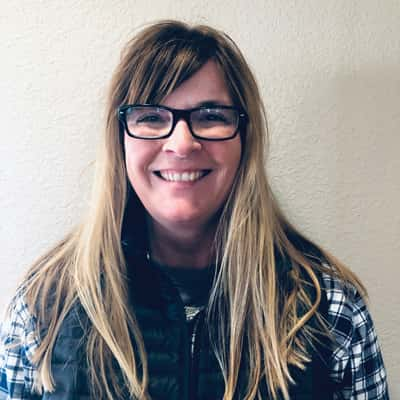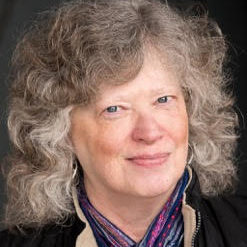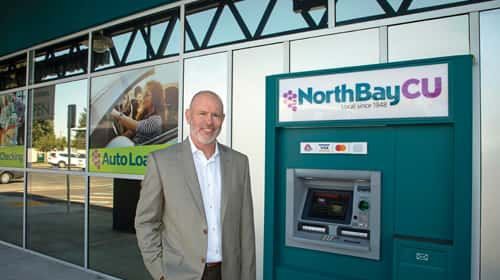At any time of day, the average looking car or van driving near you on a city street or zipping past you on Highway 101 could be filled with a half-million dollars of legal cannabis industry cash. Stacks and stacks of bills gathered from cannabis retailers and manufacturers zigzag here and there, being transported from one private safe haven to another because the typical federally-insured consumer bank will not accept large amounts of paper money from this industry.
Cannabis is legal to sell and consume in California, but remains illegal at the federal level, and that’s not likely to change anytime soon. So the state’s legal cannabis businesses must continue to pay taxes, pay employees, and pay operating expenses mostly in cash.
For better or worse, legal cannabis is here to stay. Now the banking industry is feeling the heat to step up its game and open its doors to cannabis accounts.
Annie Holman, a cannabis entrepreneur who recently co-established a manufacturing operation called The Galley on Santa Rosa’s Sebastopol Road, is hopeful that her industry can do away with the cash-only method of conducting business, sooner rather than later. “In the past, at the cannabis conventions, speakers would present banking programs and it was disappointing to listen to—there was absolutely no good news,” she says.
The Galley is an 8,300-square-foot facility, which will manufacture and distribute products made with cannabis. “We’ll have five areas of production,” she says. “A commercial kitchen for edibles, a dedicated room for topical/tincture production, a climate-controlled chocolate room, a hard candy/gummy line (both with high-automated equipment), and a bottling line for beverages.”
Making communities safer
Holman recently attended the national cannabis industry’s State of the Union in Sacramento, where banking options—or lack thereof—were the first topic of discussion. “I noticed that the thinking around banking for our industry is shifting. People are talking more about it, and it’s on everyone’s radar.”
Two years ago, North Bay Credit Union stopped talking about it and took action. The credit union is the oldest in Sonoma County, established in 1948 by and for agriculture producers. “We felt it was our mission and duty to help address the issue of cannabis banking and be part of the solution,” says Chris Call, chief executive officer of the credit union, which is insured by the National Credit Union Administration.
“We had been considering serving the cannabis industry and watched it closely for a couple of years,” says Call. “Realizing that cannabis was becoming an increasingly important part of our local economy, and then with the passage of Proposition 64 in 2016 [legalization of recreational cannabis], we knew that would create a huge influx of cannabis operators here and demand for their products. We also heard the many reports of home invasions and burglaries of cannabis operators. One of our members, who wasn’t even involved in the cannabis industry, was killed in a home invasion for that reason. The credit union’s board and I believed the banking industry’s refusal to accept cannabis money was creating an enormous public safety issue.”

The credit union’s board looked at the potential fallout in the community, including the reputational risk such a bold move would make. “If anything, our reputation has been enhanced,” he adds. “We’re trying to do something good for the community. Even if some people here don’t support the use of cannabis, they support making our streets safer.”
Late in 2017, following thorough legal research and an extensive preparation period to meet with its regulators, the North Bay Credit Union board approved a program to establish deposit accounts for cannabis operators. The application process began in November 2017.
Special compliance department
Earlier this year, Call released a statement explaining why the credit union was “going out on a limb” to support the cannabis industry: “We are completely transparent with our credit union regulators and law enforcement entities about our activities,” he stated. “We do not accept cash from cannabis operations at our branches. Cash is picked up at the customer’s place of business via armored car and delivered to our account at the Federal Reserve Bank. We perform reviews of every sales transaction to ensure it represents a state legal sale to an authorized individual or licensed company. We submit voluminous reports to federal agencies and are the de facto eyes and ears of law enforcement for the movement of funds through the accounts. Transporting large amounts of cash around our community and storing cash in homes and unprotected businesses creates an incentive for both crime and violence. A business owner should not be walking city streets with a duffle bag full of cash to pay her bills.”
As the credit union began offering banking to cannabis operators, word of mouth within the local cannabis community spread quickly, says Call. “When it was announced to the media, it created such an intense demand that we had to turn off the spigot for awhile and stop taking applicants. We started up again a few months ago, and by this summer we will likely have 60 or more cannabis accounts. There’s a long queue of applicants we are working our way through.”
Call says the credit union instituted a rigorous application process for cannabis operators, requiring extensive documentation, including background checks and license verifications. “We are dealing only with the best and most professional in the industry. We get a dozen calls a week from interested cannabis operators, and most of them are viable candidates for our services. We’re also serving a law enforcement component because we have created a paper trail that otherwise would be nonexistent on the black market.”
North Bay Credit Union created an entire compliance department from scratch just to handle cannabis accounts, which necessitated hiring about 10 new employees—including anti-money laundering specialists—together with a significant investment in software and infrastructure.
“Starting this service was expensive and labor-intensive for us,” says Call. “We’ve had to acquire numerous tech solutions to monitor all the cannabis transactions, not to mention consulting with legal advisors and other professionals. But we believe we are making an impact by removing cash from the street and putting it in a secure institution.”
The credit union’s expansion into cannabis accounts also necessitated moving to larger headquarters.
Meanwhile, most financial institutions are waiting patiently for cannabis to be rescheduled by the federal government from a dangerous drug to a legal substance. Only then will they make a determination to pursue cannabis clients.
No pandemic
“The cannabis industry itself still has a highly-illegal component and will probably remain that way for many years, so regulated businesses such as ours need to be careful,” explains Jim Brush, president of Summit State Bank. “Summit is a publicly traded bank on the Security Exchange Commission, and a fair number of banks our size and smaller are not. We are state-chartered, so we have two sets of regulators, one from the state of California and one on the federal side.
“It’s interesting to note that the state regulators come across significantly different from the federal regulators. The state regulators are at the point of encouraging us to bank with permitted cannabis operators, but that’s not what the feds are saying. They say if we take on that industry it’s at our own risk and we must have a robust MRB [marijuana-related businesses] plan in place.”
Technically, North Bay Credit Union is in violation of federal banking laws, says Call, because it’s aiding and abetting federally illegal business operations. “But Attorney General William Barr has said publicly [at his confirmation hearing] that the Department of Justice is not interested in pursuing prosecution or investigations of cannabis operations being conducted in states that have legalized it. So the cannabis question is on the back burner at the DOJ. It already has enough to worry about.”

The risk is remote that the feds will knock down the credit union’s door any time soon, he adds. “I invited the Federal Bureau of Investigation to look at our operation for cannabis accounts. They appreciated the offer, but politely declined. I think they didn’t want to appear to be giving any kind of approval.”
According to Brush, most traditional banks are reluctant to offer services to cannabis operators. “Most banks are conservative and don’t need the [cannabis] business, and are just looking to stay out of trouble. That said, our bank gets lots of calls about this topic every week and we have conversations with customers all the time. But there’s been no pandemic here in the North Bay by moving into recreational cannabis, and there’s nothing to support that it causes a pandemic.”
He points out that cannabis isn’t the only high-volume cash business around. “You can’t start singling out one business or industry over another for regulation,” says Brush. “Grocery stores, for instance, deal in large volumes of cash, and are experiencing a higher proportion of cash business as you migrate out of San Francisco, up through Sonoma County, and into Mendocino and Humboldt counties.”
A win for security services
As long as cannabis remains illegal at the federal level, and traditional banks won’t offer accounts to cannabis operators, this largely cash-dependent industry will give private security companies an opportunity to thrive. One such company is HARDCAR Security, based in Palm Springs, which is operating in 10 states. It has a staff of several people in the North Bay.
“HARDCAR is like the Brinks of the cannabis industry,” says Todd Kleperis, chief executive officer. “In California, we cover Del Norte County all the way down to Calexico. Transport is 90 percent of what we do, moving cash to Federal Reserve Banks and picking up and delivering large volumes of cannabis and cannabis products, such as distillate [a highly potent oil used to make edibles and topicals, among other things]. One 55-gallon barrel of cannabis distillate is worth about $5 million.”

The company operates a large fleet of discreet armored vehicles that look nothing like the Brinks or Loomis trucks that service banks, and Kleperis employs all military veterans. Most have served in the Iraq and Afghanistan wars and are fully trained in the use of firearms.
“HARDCAR is federally monitored and regulated at a much higher level than other cannabis security companies,” he says. “We even bought a private investigation firm just to protect banks from some of the nefarious idiots who get involved with cannabis money. As a result, all of our cannabis clients are thoroughly vetted from A to Z.”
No more whispering
According to Holman, five years ago, the thought of cannabis being legalized at the federal level was unlikely, but now a change in attitude is happening faster than she once believed. “The old ‘reefer madness’ stereotypes are long gone, and people in this industry are able to come forward to identify themselves as card-carrying cannabis operators. We don’t have to whisper it anymore. We’re more comfortable now because there are so many of us, and our conversations are finally forcing these bigger issues such as banking.”
Descheduling cannabis likely won’t occur until there’s a new administration in power in Washington, D.C., says Call, but in the meantime there will be incremental steps to make banking more available to the industry.
“It’s a multi-billion-dollar industry, and right now the atmosphere is like the Wild West,” he says. “But local banks will sit on the sidelines until it’s federally legal. Our credit union won’t be able to handle all the business, so I hope we can get other financial institutions to jump in. However, no other local banks have contacted me to inquire how to begin the process of working with cannabis clients. It’s just so scary that there’s all this cash floating around out there and subject to crime, when it could be handled electronically and safely.”





